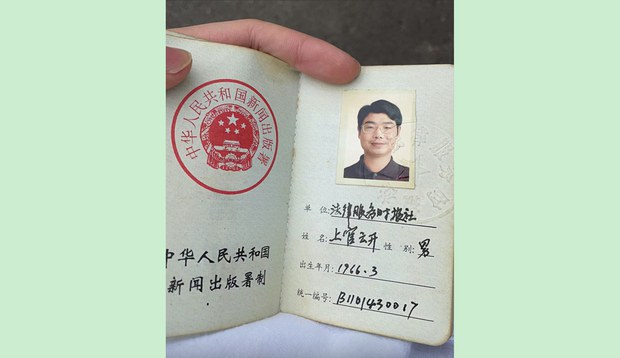Chinese police detain celebrity anti-corruption journalist for selling ointment
Share

Undated state media identity card of anti-corruption journalist Shangguan Yunka.
Authorities in the central Chinese province of Hubei have detained an investigative journalist known for exposing official corruption on charges of “selling counterfeit medicines.”
Shangguan Yunkai was taken away by local police, hooded and handcuffed, from a teahouse in Hubei’s Ezhou city, and is currently under criminal detention after police found a skin cream imported from Taiwan in his possession, his son Shangguan Keke told Radio Free Asia on Wednesday.
“This ointment is made in Taiwan, and is available on a number of e-commerce platforms in China, and … isn’t a medicine in the true sense – it’s more of a wellbeing product that is … only for external use,” Shangguan Keke said.
“All he did was put up an advertisement so people could contact him [to buy it],” he said.
Shangguan Keke said his father was detained following an apparent sting operation.
“On April 13 and 14, people from two addresses near the Ezhou municipal police department contacted my dad and said they wanted to buy the ointment,” he said. “When they had done so, my dad was arrested.”
Shangguan Yunkai is currently being held at a police-run detention center, where officers are refusing to allow a lawyer hired by his family to meet with him.
“The reception staff at the detention center told me that there was a note on the detention center system saying that Shangguan Yunkai wasn’t to be allowed to meet with any lawyers,” Shangguan Keke said.
“After we filed a complaint with the local state prosecutor, both our family and our lawyer received various kinds of threats,” he said.
He said he was contacted and warned “not to kick up a big fuss” around the case, and warned that he would be held responsible for “online words and deeds.”
Reporter who investigated graft
57-year-old Shangguan Yunkai, a former journalist at state-run paper the Rule of Law Daily, was detained after writing books, blog posts and social media posts taking aim at official corruption.
Some of his investigations had led to investigations and the punishment of hundreds of local officials and members of criminal organizations.
Lawyer Li Qinglilang, who has been following the case, said his detention was likely a form of political retaliation for his reporting.
“He’s an investigative reporter, and his work has prompted the downfall of hundreds of corrupt officials,” Li said.
“Selling [ointment and ointment-infused] plasters is very common in China,” he said. “I am guessing that his detention is due to selective and retaliatory law enforcement.”
“They use a formula that entails strict laws, widespread violation and selective enforcement,” he said, adding that the “counterfeit medicines” charge is a way of avoiding a more political charge like “picking quarrels and stirring up trouble,” and defusing public reaction to Shangguan’s case.
The charges carry similar maximum sentences of up to three years’ imprisonment.
In February 2022, Shangguan wrote an article revealing that Wang Bokun, who had been promoted to deputy director of the Huanggang Municipal People’s Congress, had transferred benefits to his private household during his tenure as Luotian County Communist Party Secretary, prompting Wang’s dismissal.
He also exposed violations of party discipline and law by Zhang Jingping, Huanggang People’s Court judge and executive deputy mayor of Ezhou’s Huangzhou district.
Shangguan Yunkai also ran a number of WeChat groups collecting clues and evidence against officials in smaller, prefecture-level cities in the region.
His detention came as official figures showed that more than 770,000 complaints of corruption were received by the Chinese Communist Party’s disciplinary arm in the first quarter of 2023, with 111,000 leading to punishments for officials, including nine at the provincial and ministerial level in the space of just 21 days.
Jiangsu-based current affairs commentator Zhang Jianping said anti-corruption operations, spearheaded by the Central Commission for Discipline Inspection, have been ongoing since supreme party leader Xi Jinping took power in 2012.
Translated by Luisetta Mudie.







